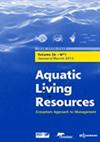Knowledge and behavior: a study on adoption of best management practices among Sri Lankan shrimp farmers
IF 1.9
4区 农林科学
Q3 FISHERIES
引用次数: 0
Abstract
Shrimp farming in Sri Lanka is economically advantageous but faces challenges like disease outbreaks and environmental issues. The government has introduced Best Management Practices (BMPs) to ensure sustainability. This study aimed to assess BMP knowledge and adoption among Sri Lankan shrimp farmers while identifying socio-demographic and behavioral factors influencing them, which have not been previously assessed. Data were gathered from 131 shrimp farmers in Puttalam district in Sri Lanka through a questionnaire survey and analyzed using descriptive statistics and ordered logistic regressions. The results showed that 26% of farmers had poor BMP knowledge, while 37% each had fair and good knowledge. Regarding adoption, 2% exhibited poor, 89% fair, and 9% good BMP adoption. According to the ordered logistic regression results, BMP training (p < 0.01), education (p < 0.05), and workforce (p < 0.05) significantly affect the knowledge level of BMPs. In contrast, age (p < 0.05), experience (p < 0.05), income share (p < 0.1), and risk preference (p < 0.1) significantly affect the adoption of BMPs. It is recommended to provide more BMP training to shrimp farmers, to improve their knowledge. Moreover, considering socioeconomic and behavioral factors is crucial when designing policies and interventions to promote BMP adoption.
知识与行为:斯里兰卡虾农采用最佳管理做法的研究
斯里兰卡养虾在经济上有优势,但面临疾病爆发和环境问题等挑战。政府引入了最佳管理实践(BMPs)来确保可持续发展。本研究旨在评估斯里兰卡虾农对BMP的了解和采用情况,同时确定影响他们的社会人口和行为因素,这些因素以前没有评估过。通过问卷调查收集了斯里兰卡putalam地区131个虾养殖户的数据,并使用描述性统计和有序逻辑回归进行了分析。结果显示,26%的农民BMP知识较差,37%的农民BMP知识较好。关于BMP的采用,2%表现不佳,89%表现一般,9%表现良好。根据有序逻辑回归结果,BMP训练(p <;0.01),教育(p <;0.05),劳动力(p <;0.05)显著影响bmp知识水平。相反,年龄(p <;0.05),经验(p <;0.05),收入份额(p <;0.1),风险偏好(p <;0.1)显著影响bmp的采用。建议为虾农提供更多的BMP培训,以提高他们的知识。此外,在设计促进BMP采用的政策和干预措施时,考虑社会经济和行为因素是至关重要的。
本文章由计算机程序翻译,如有差异,请以英文原文为准。
求助全文
约1分钟内获得全文
求助全文
来源期刊

Aquatic Living Resources
农林科学-海洋与淡水生物学
CiteScore
2.30
自引率
0.00%
发文量
10
审稿时长
>24 weeks
期刊介绍:
Aquatic Living Resources publishes original research papers, review articles and propective notes dealing with all exploited (i.e. fished or farmed) living resources in marine, brackish and freshwater environments.
Priority is given to ecosystem-based approaches to the study of fishery and aquaculture social-ecological systems, including biological, ecological, economic and social dimensions.
Research on the development of interdisciplinary methods and tools which can usefully support the design, implementation and evaluation of alternative management strategies for fisheries and/or aquaculture systems at different scales is particularly welcome by the journal. This includes the exploration of scenarios and strategies for the conservation of aquatic biodiversity and research relating to the development of integrated assessment approaches aimed at ensuring sustainable and high quality uses of aquatic living resources.
 求助内容:
求助内容: 应助结果提醒方式:
应助结果提醒方式:


